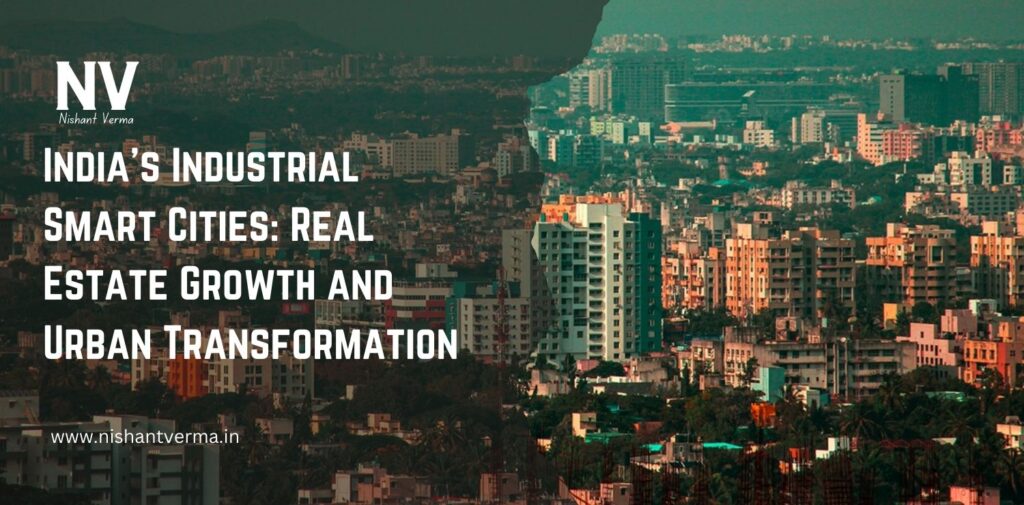The Indian government’s recent approval of 12 industrial smart cities, with a significant investment of ₹28,602 crore, marks a transformative step for the nation’s urban infrastructure and real estate sector. These smart cities are designed to be hubs of economic activity, fostering industrial growth, technological innovation, and sustainable urban development. This ambitious project is expected to have a profound positive impact on India’s real estate landscape, driving demand for both residential and commercial properties, and enhancing the quality of life in these regions.

Boost to Real Estate Demand
The development of industrial smart cities is expected to significantly boost real estate demand. As these cities emerge as centers of industrial and technological excellence, they will attract a large workforce, leading to an increased need for residential properties. The inflow of professionals, both from within India and abroad, will create a vibrant housing market. Furthermore, the establishment of industries will stimulate the demand for commercial real estate, including office spaces, retail outlets, and logistic hubs.
Infrastructure Development and Its Ripple Effect
One of the core components of these smart cities is the emphasis on robust infrastructure. This includes the development of high-quality roads, efficient public transportation systems, water supply, electricity, and digital connectivity. Such infrastructure not only enhances the functionality of these cities but also makes them attractive for real estate investments. Properties in well-planned, well-connected areas typically see higher appreciation rates. The ripple effect of this infrastructure development will be felt in the surrounding areas as well, leading to the overall upliftment of the region’s real estate market.

Integration of Technology and Real Estate
The integration of advanced technologies into these smart cities will also revolutionize the real estate sector. Smart cities are expected to incorporate IoT (Internet of Things), AI (Artificial Intelligence), and big data analytics to manage urban services more efficiently. For the real estate sector, this means the development of smarter homes and commercial spaces that offer enhanced security, energy efficiency, and convenience. The demand for tech-enabled properties is likely to surge as consumers increasingly seek out modern, efficient living spaces.
Investment Opportunities and Economic Growth
The creation of industrial smart cities presents a multitude of investment opportunities in real estate. With the government’s backing and a clear development roadmap, these cities are expected to attract significant domestic and foreign investment. This inflow of capital will not only spur the construction of new residential and commercial projects but also drive up the value of existing properties. Moreover, the economic growth generated by these smart cities will create a more prosperous environment for real estate transactions, benefiting developers, investors, and consumers alike.

Enhanced Quality of Life
A key objective of the smart city initiative is to improve the quality of life for residents. By providing better infrastructure, efficient services, and sustainable living conditions, these cities are designed to offer a higher standard of living. For the real estate sector, this translates into an increased demand for high-quality residential properties that cater to the needs of modern urban dwellers. Developers are likely to focus on building eco-friendly, well-designed housing projects that align with the smart city ethos, further boosting the attractiveness of these regions.

Regional Development and Balanced Urbanization
The establishment of industrial smart cities is also a strategic move to promote balanced urbanization across India. Traditionally, economic growth and urban development have been concentrated in a few major cities, leading to overcrowding and increased pressure on resources. By developing smart cities in various regions, the government aims to decentralize economic activities and create new growth centers. This will not only alleviate the burden on existing urban centers but also unlock the real estate potential in less developed areas, leading to more equitable regional development.
Challenges and Considerations
While the prospects for the real estate sector are promising, there are challenges that need to be addressed. The success of these smart cities depends on effective implementation and management of the projects. Delays in infrastructure development, regulatory hurdles, and land acquisition issues could impact the real estate market negatively. Additionally, ensuring that the benefits of smart cities are accessible to all sections of society, including affordable housing, will be crucial for the long-term sustainability of these projects.
Conclusion
The approval of 12 industrial smart cities by the Indian government is a landmark decision that promises to reshape the country’s urban and real estate landscape. The anticipated positive impacts on real estate demand, infrastructure development, and overall quality of life make this initiative a significant driver of growth in the sector. As these smart cities take shape, they will likely become the new hotspots for real estate investment, offering a unique blend of modern living, economic opportunities, and sustainable development. The real estate sector, in turn, will play a critical role in realizing the vision of these smart cities, contributing to India’s journey towards becoming a global economic powerhouse.




